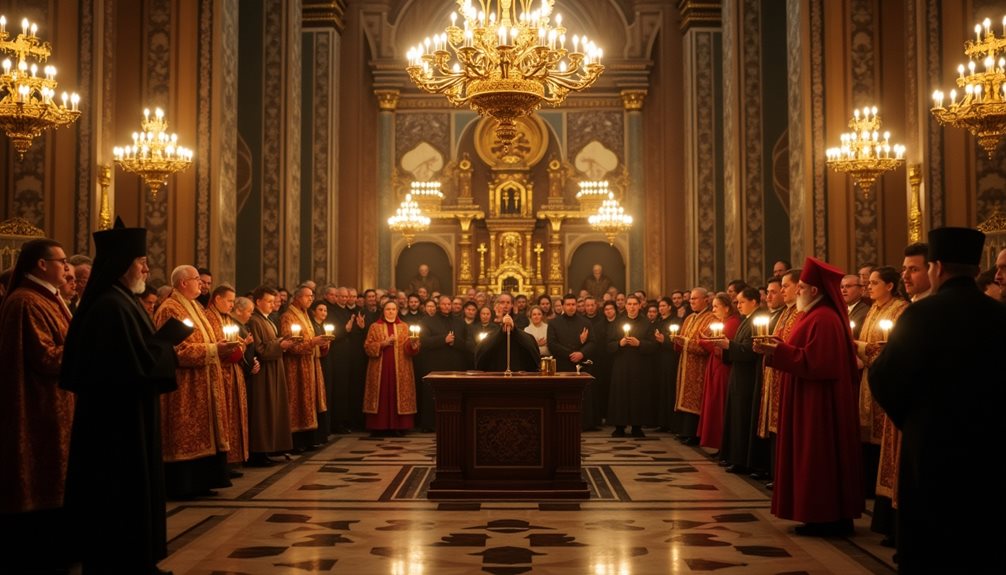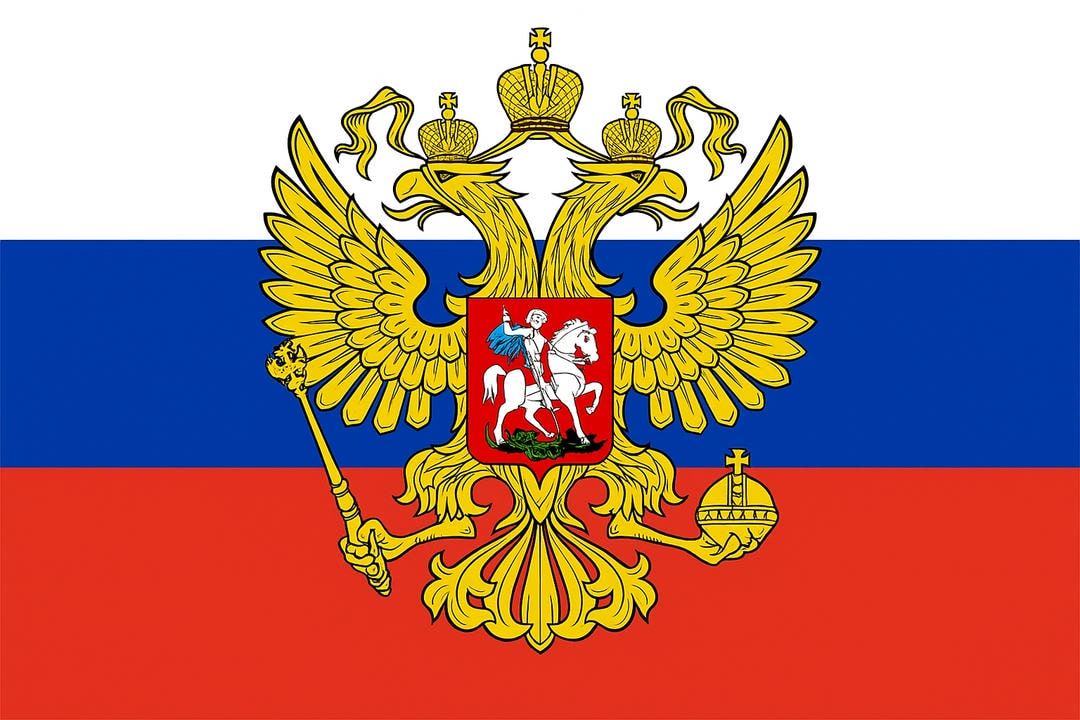When you think about Russia, you might picture vast landscapes and historic cities, but have you considered the importance Russians place on family and community? These bonds aren’t just niceties—they’re essential to daily life. Imagine traditions like communal meals and storytelling that strengthen ties and create a sense of belonging. Extended family members often step in for caregiving and child-rearing, and community celebrations bring everyone together, fostering resilience. How do these practices adapt in the face of economic changes and urbanization? Let’s explore how these deep-rooted traditions shape modern Russian society.
Historical Roots of Family Unity
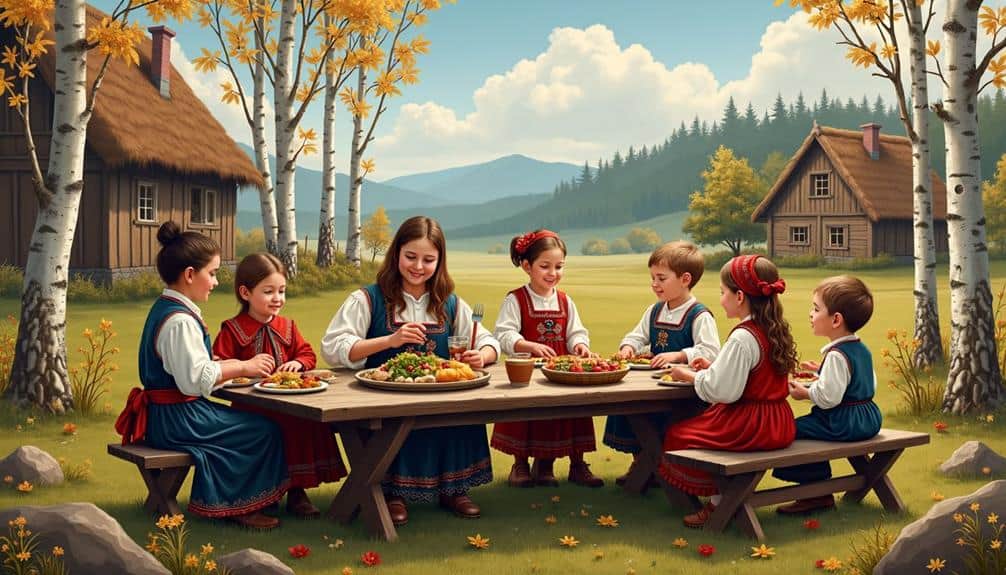
Although many cultures place a high value on family, the historical roots of family unity in Russia are particularly profound and complex. You’ll find that these roots are deeply intertwined with the nation’s cultural traditions and family rituals, which have evolved over centuries. Understanding this context helps you appreciate why Russian families often seem so close-knit and resilient.
In Russian history, family served as the primary unit of social organization, especially during tough times like wars and political upheavals. These periods fostered a reliance on familial bonds for survival and mutual support. You can see this reflected in various cultural traditions, such as the communal preparation of meals and collective storytelling, which reinforced a sense of belonging and solidarity.
Family rituals, including the celebration of major life events like births, weddings, and funerals, further cemented these bonds. These rituals weren’t just social obligations; they were vital for maintaining the emotional and psychological well-being of the family unit.
When you explore these traditions, you’ll notice how they emphasize interdependence and collective responsibility, laying the groundwork for a robust family structure that persists to this day.
Role of Extended Family
In Russian culture, the role of the extended family is crucial, serving as a foundation for both social and emotional support. You’ll find that grandparents, aunts, uncles, and even distant relatives play an integral part in daily life. This network isn’t just about proximity but also about maintaining family traditions.
For instance, you might observe that family gatherings are frequent and often involve shared meals and storytelling, reinforcing a sense of belonging and continuity.
From an ethnographic perspective, the extended family functions as a safety net. When facing life’s challenges, you can rely on this broader familial circle for emotional support. It’s common for multiple generations to live under one roof, a practice that fosters close-knit relationships and collective problem-solving.
This multigenerational living arrangement isn’t merely about convenience; it’s a deeply ingrained cultural practice that emphasizes mutual assistance and shared responsibilities.
Moreover, you’ll notice that these relationships extend beyond immediate family, creating a robust community of care. This interconnectedness means that you’re seldom alone in navigating life’s ups and downs.
The extended family, therefore, isn’t just a social unit but a vital source of emotional resilience.
Importance of Community Celebrations
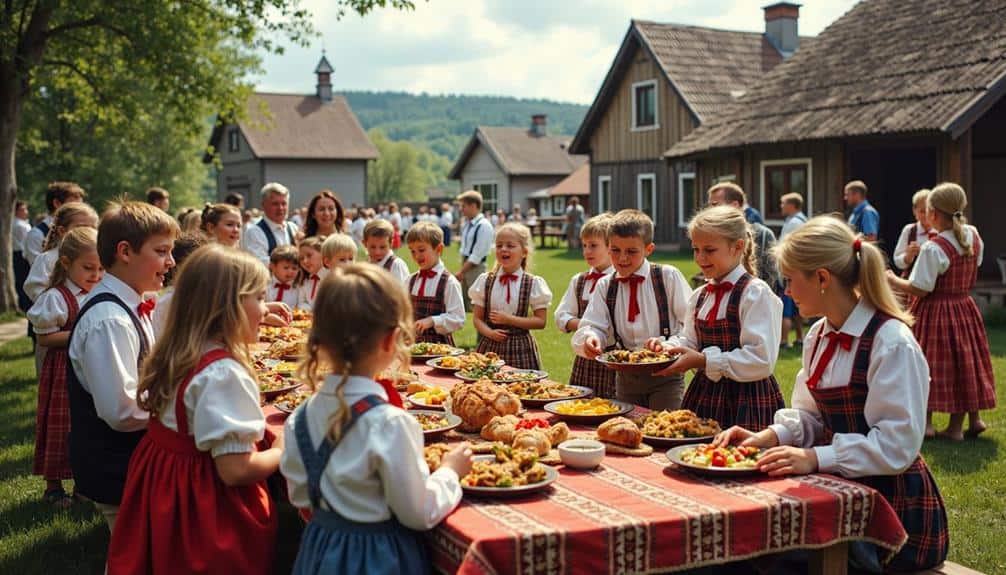
Steeped in tradition, community celebrations in Russia play a pivotal role in reinforcing social cohesion and cultural identity. When you attend these local festivals, you’ll notice how they’re not just events but vibrant expressions of shared history and collective memory.
These communal gatherings serve as a nexus for social interaction, providing a platform for residents to connect, celebrate, and strengthen their bonds.
Local festivals like Maslenitsa and Victory Day are prime examples. During Maslenitsa, you’ll see people of all ages participating in activities that range from traditional games to communal feasts.
It’s a week-long festival that signifies the end of winter and the coming of spring, but more importantly, it’s a time for renewal and community bonding.
Victory Day, on the other hand, honors the sacrifices of previous generations, fostering a sense of unity and shared heritage.
Intergenerational Living Arrangements
While community celebrations serve as a cornerstone for social cohesion, intergenerational living arrangements in Russia offer another dimension of familial and societal interconnectedness. In many Russian households, you’ll find multiple generations cohabiting under one roof. This practice isn’t merely about sharing living spaces; it’s deeply rooted in cultural traditions that emphasize family dynamics and collective caregiving roles.
By living together, family members can offer essential emotional support and fulfill social responsibilities more effectively. Elderly relatives often take on caregiving roles for grandchildren, providing a stable presence in daily routines. This shared living arrangement ensures that no one feels isolated, fostering a strong sense of belonging.
Intergenerational homes also facilitate frequent family gatherings, where stories, traditions, and values are passed down, reinforcing familial bonds. These gatherings aren’t just special occasions but integral parts of everyday life, making the home a hub of continuous interaction and emotional warmth.
The structure of these households allows for seamless integration of social responsibilities and caregiving roles, creating a supportive environment. By understanding these living arrangements, you gain insight into how Russians maintain tight-knit family dynamics, blending tradition with modern life in a harmonious balance.
Collective Child-Rearing Practices
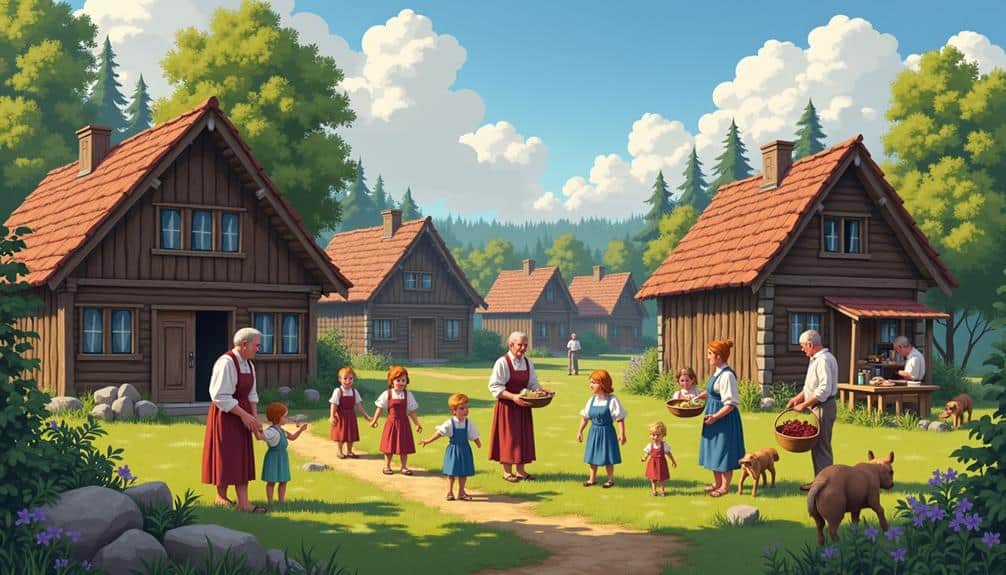
Collective child-rearing practices in Russia don’t just reflect a communal approach to upbringing but also underscore deep-seated cultural values. You’ll find that cooperative parenting is deeply ingrained in Russian society, where the well-being of children is a shared responsibility among family members and the broader community. This approach facilitates a robust network of support that ensures children receive guidance, care, and education from multiple sources.
In urban settings, cooperative parenting often involves extended family members. Grandparents, aunts, and uncles frequently play active roles in daily childcare, providing emotional and practical support. This shared responsibility helps mitigate the pressures on nuclear families, allowing parents to balance work and family life more effectively.
In neighborhoods, you might observe how neighbors and close friends contribute to child-rearing. It’s not uncommon for children to play together under the watchful eyes of various adults, fostering a sense of community and collective oversight.
This system ensures that no child is ever truly alone, reinforcing the communal ethos that children are a communal asset rather than just the responsibility of their biological parents.
Support Systems in Rural Areas
In rural areas of Russia, familial and communal support systems are both resilient and indispensable to daily life. These systems are deeply entrenched in local traditions, where family units and neighbors form a tightly-knit web of mutual aid and cooperation.
The importance of neighborly assistance can’t be overstated; it’s a lifeline, especially in the harsh conditions of the Russian countryside. You’ll find that locals rely heavily on each other for various forms of support, from sharing food supplies during harsh winters to helping with agricultural tasks.
These acts aren’t merely transactional but are embedded in a culture of reciprocity and collective well-being. The sense of community is palpable, and it’s common for neighbors to gather for communal activities, reinforcing social bonds.
Local traditions play a key role in maintaining these support systems. Festivals, communal gatherings, and shared rituals are more than just social activities; they’re essential in fostering a sense of unity and shared responsibility.
Urban Community Networks
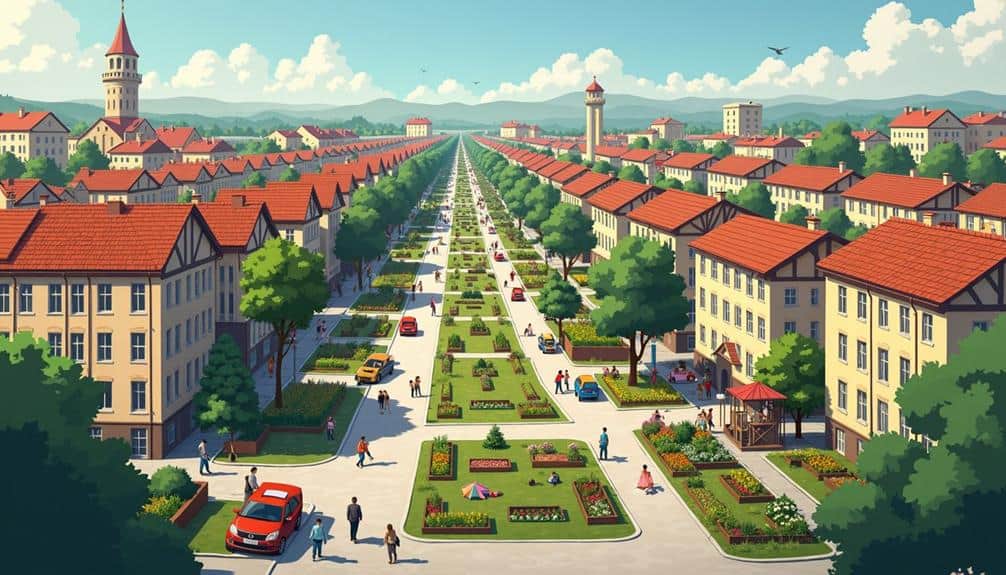
Navigating the complexities of urban life in Russia, you’ll find that community networks play a crucial role, albeit in a different form compared to their rural counterparts. In cities, the fast-paced lifestyle necessitates adaptive ways of fostering communal bonds. One key aspect is urban gardening. Amidst towering apartment blocks, you’ll discover small, shared garden plots where residents grow vegetables and flowers.
These green spaces not only provide fresh produce but also foster a sense of belonging among neighbors.
Local markets in urban areas serve as another vital node in these networks. They aren’t just places to buy groceries; they’re social hubs where people exchange news, maintain relationships, and support local vendors.
By frequenting these markets, you contribute to a micro-economy that sustains the community’s fabric.
Urban community networks in Russia also extend to informal support groups and neighborhood associations. These entities often organize events like clean-up drives and cultural festivals, reinforcing social cohesion.
Although urban life can be isolating, these communal initiatives remind you that even in a bustling metropolis, the essence of community support remains integral to Russian cultural identity.
Religious Influence on Togetherness
While urban community networks in Russia provide a vital framework for social interaction, religious traditions also play a significant role in fostering togetherness. You’ll find that faith traditions, primarily rooted in the Russian Orthodox Church, deeply influence communal bonds. These traditions offer a sense of continuity and shared identity, which are crucial in maintaining strong familial and community ties.
Communal rituals, such as attending church services or participating in religious festivals, are more than just spiritual acts; they’re social glue. When you partake in these rituals, you’re not just practicing your faith but also reaffirming your connection to the community. For instance, the celebration of Easter or Christmas brings families and neighbors together, fostering a sense of unity and shared purpose.
Moreover, the church often acts as a support network, offering assistance in times of need. This communal support extends beyond religious practices and permeates everyday life. Through religious gatherings, you’ll notice how people form tight-knit communities that provide emotional and sometimes even material support.
Understanding these religious influences sheds light on the broader cultural emphasis on communal living and familial bonds that are so characteristic of Russian society.
Impact of Economic Changes
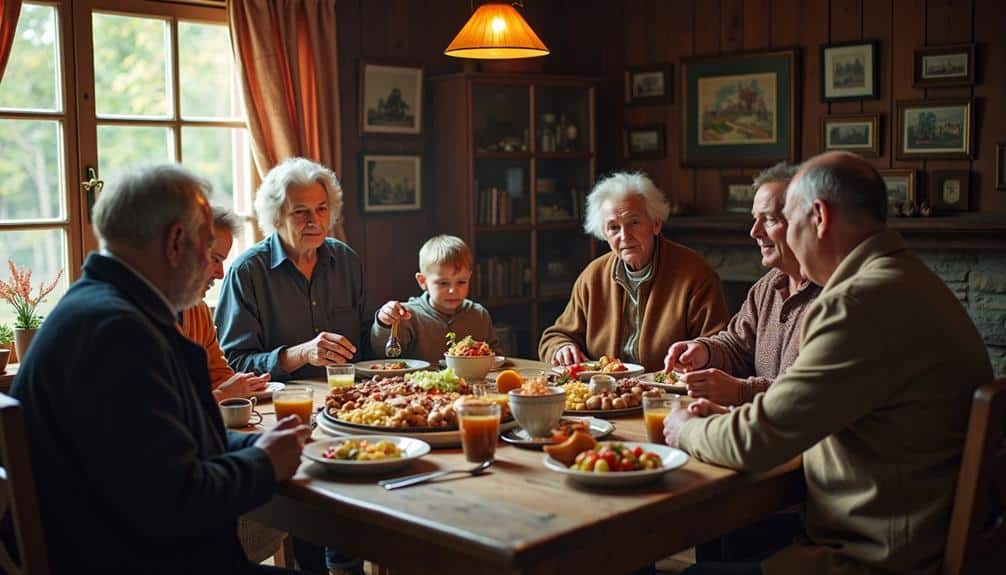
Economic transformations in Russia have profoundly reshaped familial bonds and community dynamics. You’ve probably noticed how the market economy’s shift has increased economic disparities, affecting social mobility and altering traditional family roles.
This economic upheaval has created a new social landscape where some families find themselves rising in wealth and status, while others struggle with poverty and limited opportunities.
In this context, you can see how economic disparities often strain familial relationships. Families that once relied on a stable income now face job insecurity, forcing them to adapt and find new ways to support each other.
The pressure to achieve social mobility can lead to younger generations pursuing opportunities far from home, thereby weakening the tight-knit community fabric that once held Russian families together.
Moreover, community support networks have had to evolve. Where local support systems previously flourished, now, there’s a growing reliance on formal institutions and state welfare.
Understanding this shift helps you appreciate the resilience and adaptability of Russian families, as they navigate the complexities of modern economic realities while striving to maintain their cultural emphasis on unity and mutual support.


